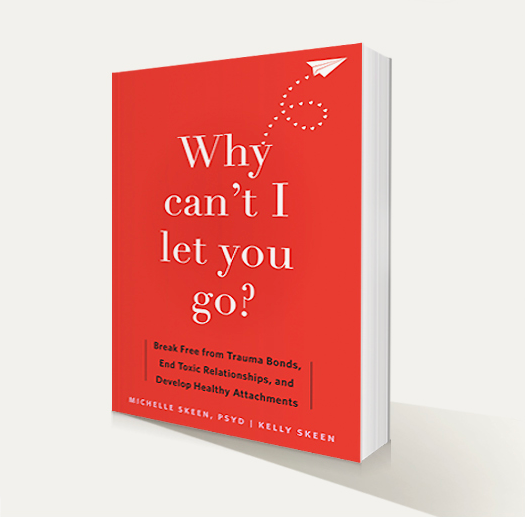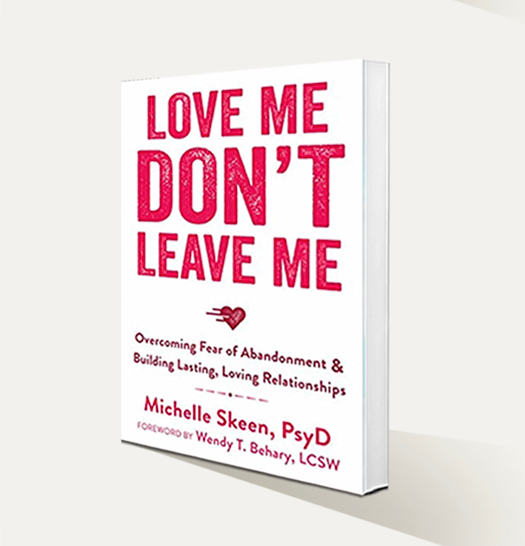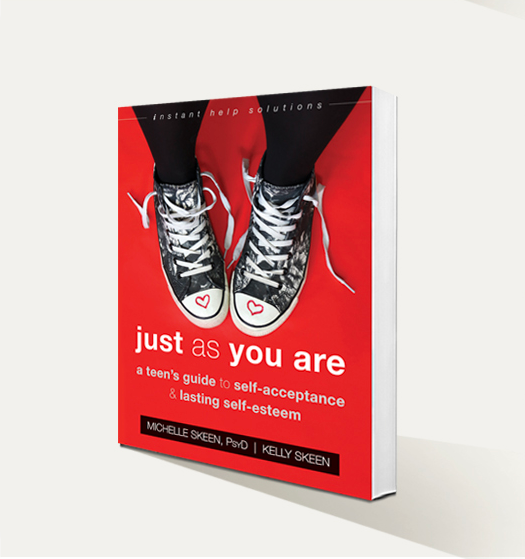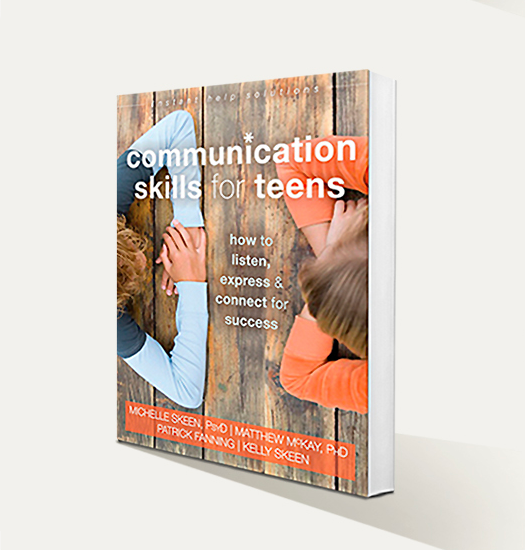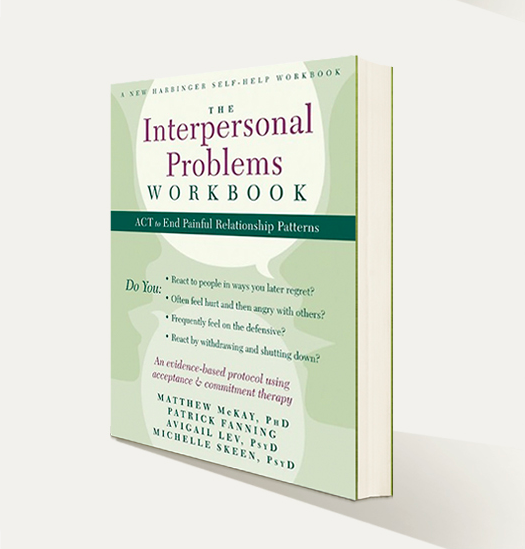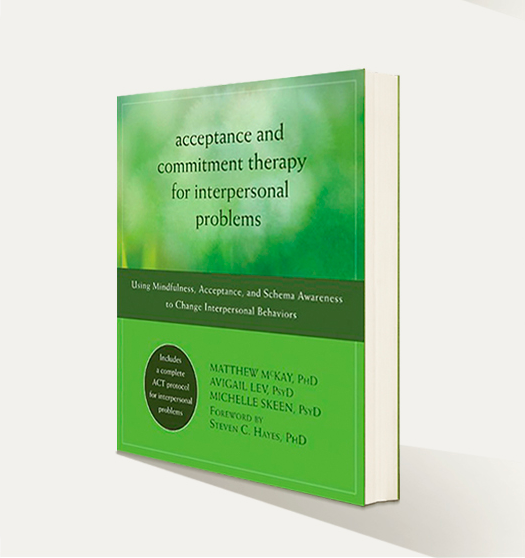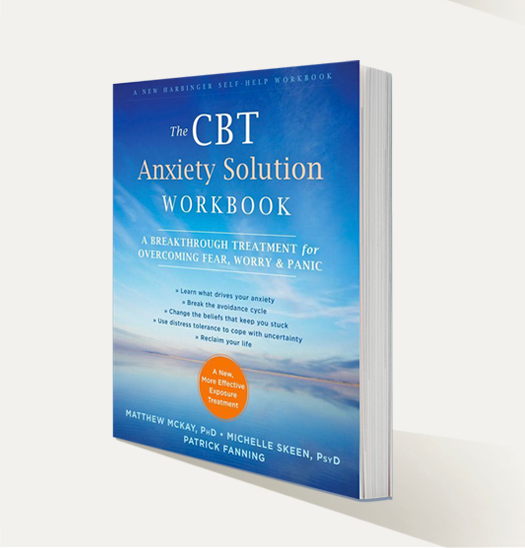Radio show on Thursday November 1, 2018
This week on Relationships 2.0 my guest host is Shawn T. Smith PsyD who interviewed me about my book Love Me Don’t Leave Me: Overcoming the Fear of Abandonment & Building Lasting, Loving Relationships
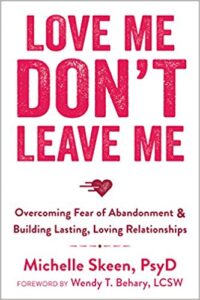 About the book: Everyone thrives on love, comfort, and the safety of family, friends, and community. But if you are denied these basic comforts early in life, whether through a lack of physical affection or emotional bonding, you may develop intense fears of abandonment that can last well into adulthood―fears so powerful that they can actually cause you to push people away. If you suffer from fears of abandonment, you may have underlying feelings of anger, shame, fear, anxiety, depression, and grief. These emotions are intense and painful, and when they surface they can lead to a number of negative behaviors, such as jealousy, clinging, and emotional blackmail. In Love Me, Don’t Leave Me, therapist Michelle Skeen combines acceptance and commitment therapy (ACT), schema therapy, and dialectical behavioral therapy (DBT) to help you identify the root of your fears. In this book you’ll learn how schema coping behaviors―deeply entrenched and automatic behaviors rooted in childhood experiences and fears―can take over and cause you to inadvertently sabotage your relationships. By recognizing these coping behaviors and understanding their cause, you will not only gain powerful insights into your own mind, but also into the minds of those around you. If you are ready to break the self-fulfilling cycle of mistrust, clinginess, and heartbreak and start building lasting, trusting relationships, this book will be your guide.
About the book: Everyone thrives on love, comfort, and the safety of family, friends, and community. But if you are denied these basic comforts early in life, whether through a lack of physical affection or emotional bonding, you may develop intense fears of abandonment that can last well into adulthood―fears so powerful that they can actually cause you to push people away. If you suffer from fears of abandonment, you may have underlying feelings of anger, shame, fear, anxiety, depression, and grief. These emotions are intense and painful, and when they surface they can lead to a number of negative behaviors, such as jealousy, clinging, and emotional blackmail. In Love Me, Don’t Leave Me, therapist Michelle Skeen combines acceptance and commitment therapy (ACT), schema therapy, and dialectical behavioral therapy (DBT) to help you identify the root of your fears. In this book you’ll learn how schema coping behaviors―deeply entrenched and automatic behaviors rooted in childhood experiences and fears―can take over and cause you to inadvertently sabotage your relationships. By recognizing these coping behaviors and understanding their cause, you will not only gain powerful insights into your own mind, but also into the minds of those around you. If you are ready to break the self-fulfilling cycle of mistrust, clinginess, and heartbreak and start building lasting, trusting relationships, this book will be your guide.
About the author: Michelle Skeen, PsyD, has a doctorate in clinical psychology. She is author of seven books, all designed to enhance relationships by emphasizing the importance of identifying core values and valued intentions, limited thinking, mindfulness, self-compassion, empathy, and effective communication and conflict resolution skills. Her passion is coaching individuals in creating and maintaining healthy relationships by bringing awareness to obstacles (fears and beliefs), which often work unconsciously to limit connections with others. Michelle believes that an early introduction and education in core values and healthy communication are essential life skills for success. To that end, Michelle and her daughter, Kelly, coauthored Communication Skills for Teens and Just As You Are. Skeen completed her postdoctoral work at the University of California, San Francisco. She codeveloped an empirically validated protocol for the treatment of interpersonal problems that resulted in two books: Acceptance and Commitment Therapy for Interpersonal Problems and The Interpersonal Problems Workbook. Michelle’s work has appeared in more than thirty publications around the world. She hosts a weekly radio show called Relationships 2.0 with Dr. Michelle Skeen that airs nationally. To find out more, visit her website at www.michelleskeen.com.
My radio show on Thursday May 10, 2018
This week on Relationships 2.0 my guest is Shawn T. Smith, PsyD author of The Tactical Guide to Women: How Men Can Manage Risk in Dating and Marriage.
 About the book:
About the book:
For men, love is a high-stakes gamble. The right woman can be the best part of a man’s life, and the wrong one can lead to personal and financial ruin. In today’s climate, no man should venture into romance without a reliable risk-management strategy.
The Tactical Guide to Women delivers a solid plan for allowing the right women into your life, and keeping the wrong ones at a safe distance. You’ll discover how to:
- Identify good women of low drama and high character
- Reduce your vulnerability to women who seem perfect for you—but aren’t
- Spot the early warning signs of emotional instability
You’ll also learn:
- Critical techniques for seeing women clearly
- The most common mistakes that lead men into disastrous relationships
- How to reduce the odds of a good relationship going bad
Impeccably researched and backed by the author’s decade of clinical experience, The Tactical Guide to Women provides men with desperately needed, rarely discussed strategies for finding sanity, joy, and companionship. This is not another book about getting laid. This book is about not getting screwed.
About the author:
Shawn Smith is a clinical psychologist in Denver, Colorado and the author of five psychology books. He also writes a blog at docsmith.co, where he has answered important questions such as: Can dogs learn to read? Why do I feel amorous when I have a cold? Is my ex possessed? Shawn’s writing is light-hearted, impeccably researched, and always useful.
How to Talk to Anyone
As Seen In
Article related to Communication Skills for Teens:
How to Talk to Anyone
Choices
by Andrea Bartz
click to enlarge:
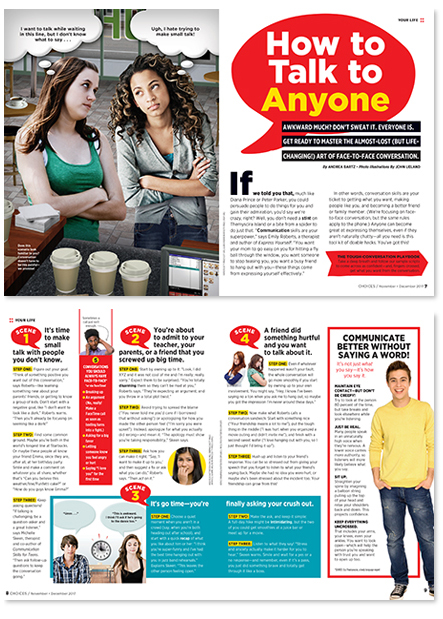
These 3 Stories Perfectly Illustrate Why It’s So Hard To Get Over Your First Love
Women’s Health
by Anna Breslaw
First comes love… then comes a tsunami of what-ifs. Your first relationship is like no other, which is why its shadow lingers and shapes every romance that follows. How do you make peace with those memories—and is there such a thing as a second chance?
When artist Rora Blue asked a single Q—”What would you say to the first person you fell for?”—those were three of the 34,000 responses she received. The messages became a Web installation called The Unsent Project, which continues to grow. Why the lasting intensity? “It’s called primacy,” says Jennifer Talarico, Ph.D., a cognitive psychologist at Lafayette College in Easton, Pennsylvania. “Memories of a first experience are more vivid than similar events that come later.” Like baby ducks thinking a dust mop is “mom,” a part of you can’t shake that imprint of “partner”—enticing some to toy with (or even act on) rejoining that partner years later. Read on for intel on how to live with the enduring presence of the one who taught you about love, good and bad.
LASTING IMPRESSION: ALISON*, 24
She still uses her high school boyfriend’s nickname and birthday for her Web passwords—seven years after they broke up. “I lost my virginity to him,” Alison says. “It was New Year’s Eve, with literal fireworks going off in the background. Cheesy, but awesome.” Beyond the fact that sex releases a surge of oxytocin and dopamine, first sex partners also play a key role in developing our identities, says Michelle Skeen, Psy.D., author of Love Me, Don’t Leave Me. “She became a sexual being with him, and he was the first person to reflect that new self back to her.”
Now Alison is “happily settled in a relationship with the person I know is The One”—and yet, paradoxically, she still thinks about her first and secretly hopes she might run into him someday and get coffee together. “He just left such an impression on my heart. Even though I haven’t spoken to him in ages and probably never will, I feel like I’ve been permanently molded by him.” Skeen’s response? First, change those passwords, which keep memories of the ex alive. “When we’re continually looking back at the past, it impacts the present.” Research bears out the dangers: A new Kansas State University study of 7,000 couples shows that the more accepting people were of their partners being in touch with former flames on social media, the more harmful it was to their relationship—partly because it can create a “slippery slope” of temptation during difficult times.
The other problem with musing about him is that it’s too easy to embellish the past, especially when you’re feeling ticked off at your SO. “Remembering something isn’t like replaying a video,” says Talarico. Instead, she explains, it’s a process of reconstruction. The basic elements stay the same, but you put them together a bit differently each time. So for instance, a trip you shared that had real moments of conflict can seem, in gauzy retrospect, like one long romantic high.
UNFINISHED BUSINESS: SANDRA, 30
When she was 18, a college sophomore studying abroad at Cambridge, Sandra met her first boyfriend; he was British and 22. “Ever since then I’ve thought that this is how love should feel—like a force of nature greater than yourself,” she recalls. When she returned to the States, they kept it up long-distance for a year. “We planned our future together, from the apartment we’d share to the daughter we were sure we’d have, named Chloe.” Sandra was blindsided when he broke up with her right before her graduation, saying he needed to focus on his career. “For weeks, I lay in bed hardly eating or sleeping,” she says. “I fell into a deep well of self-loathing—I felt like the only logical conclusion was that I was so horrible, a man wouldn’t want to be with me.”
The intensity of Sandra’s anguish actually has a neurological basis, says Helen Fisher, Ph.D., anthropologist and research fellow at the Kinsey Institute at Indiana University in Bloomington. Fisher analyzed the brains of people who’ve been dumped, using an fMRI scanner, and found that when they thought about their former love, they experienced a “brain explosion” that targeted areas linked to cravings, addiction, and physical pain. That chemical storm can lead to a sense of unfinished business—even, as in Sandra’s case, a decade later.
“I’ve had plenty of passionate romances since then, but have never felt consumed like that,” she says. And she may never again, says Skeen: “When we’re younger, we’re much more emotional, and we haven’t been burned yet.” So we enter into the relationship at full speed, and with very little self-protection. Sandra still occasionally dreams about him, and she wonders if meeting up with him once would break the spell. But what haunts her, says Skeen, “is not so much the loss of him, but the visceral memory of her hurt, younger self.” Skeen advises a dose of self-compassion. “Her 30-year-old self is judging the 18-year-old she once was. I would have her write a letter to that younger self, saying, ‘Look, you were only 18. You didn’t have all the answers, so don’t beat up on yourself.’ “
ANOTHER SHOT: LORI AND JOHN, 51 AND 53
They dated innocently in high school, at ages 15 and 17: no sex, just lots of time together. Then her family moved, and despite love letters and phone calls, they eventually lost touch—but neither ever forgot the other, even though both married other people. “I dreamed of John so many times,” says Lori. “And I wished my husband was like John, who became the epitome of who I thought a man and husband should be.”
These long-lasting memories are due to a “reminiscence bump,” says Talarico; you tend to recall best the life events that occurred from ages 15 to 30, perhaps because those years contain the bulk of our first experiences. When Lori’s unhappy marriage broke up, she tracked down John online and found out he was also divorced. They talked on the phone that night, and soon after they were Skyping daily. Eighteen months later, they got engaged. Says Lori, “I felt compelled to find the kind of love I knew before.”
Will it last the second time around? Two circumstances can improve your odds of success, says Nancy Kalish, Ph.D., author of Lost & Found Lovers, and Lori and John fit both: having met at age 22 or younger, and breaking up because of “situational factors,” like a move, rather than core disagreements. Kalish’s 20 years of research show that three-quarters of reuniting couples will stay together long-term—if both parties are single when they reconnect. “Many people who reunite say their ‘lost love’ became the ‘standard for all the rest,’” she says. “It’s not just nostalgia, or sex, or an unresolved issue. It’s real love.”
*All names and identifying details have been changed.
Read it on Women’s Health
My radio show on Thursday September 21, 2017
This week on Relationships 2.0 my guest is Rebekah Freedom McClaskey author of Breakup Rehab: Creating the Love You Want
 About the book:
About the book:
Turn Your Pain from Breakup into an Opportunity to Grow toward True Love
After her devastating breakup, counselor Rebekah Freedom McClaskey became inspired by her work in the field of addiction recovery to craft a safe, step-by-step path to forging healthy relationships based on honesty, love, integrity, and trust. Breakup Rehab addresses post-breakup chaos, providing clarity and direction so that your next relationship will be your best relationship.
This wise, real-world, and often humorous guide acknowledges the state of grief or resignation that comes with a breakup and then walks you through the stages of forgiveness and letting go. Along the way, you’ll experience a more compassionate self-awareness as you rebuild self-confidence and learn how to be loved for who you truly are. These steps will propel you forward on your unique path, as you recognize your life’s purpose and then travel toward well-being and a love that will set you free.
About the author:
Rebekah Freedom McClaskey is a breakup specialist whose private practice focuses on helping clients get what they want out of life and love. She lives in Southern California.
My radio show on Thursday June 8, 2017
This week on Relationships 2.0 my guest is Alexandra Solomon, PhD author of Loving Bravely: 20 Lessons of Self-Discovery to Help You Get the Love You Want
 About the book:
About the book:
Real love starts with you. In order to attract a life partner and build a healthy intimate relationship, you must first become a good partner to yourself. This book offers twenty invaluable lessons that will help you explore and commit to your own emotional and psychological well-being so you can be ready, resilient, and confident in love.
Many of us enter into romantic relationships full of expectation and hope, only to be sorely disappointed by the realization that the partner we’ve selected is a flawed human being with their own neuroses, history, and desires. Most relationships end because one or both people haven’t done the internal work necessary to develop self-awareness and take responsibility for their own experiences. We’ve all heard “You can’t love anyone unless you love yourself,” but amid life’s distractions and the myth of perfect, romantic love, how exactly do you do that?
In Loving Bravely, psychologist, professor and relationship expert Alexandra H. Solomon introduces the idea of relational self-awareness, encouraging you to explore your personal history to gain an understanding of your own relational patterns, as well as your strengths and weaknesses in relationships. By doing so, you’ll learn what relationships actually require, beyond the fairytale notions of romance. And by maintaining a steady but gentle focus on yourself, you’ll build the best possible foundation for making a loving connection.
By understanding your past relationship experiences, cultivating a strong sense of self-awareness, and determining what it is you really want in a romantic partner—you’ll be ready to find the healthy, lasting love your heart desires.
About the author:
Alexandra H. Solomon, PhD, is staff clinical psychologist, member of the teaching faculty in the marriage and family therapy graduate program, and clinical assistant professor of psychology at The Family Institute at Northwestern University. In addition to her clinical work with couples and individuals, Solomon teaches graduate and undergraduate students. One of her courses is Northwestern University’s internationally renowned “Building Loving and Lasting Relationships: Marriage 101,” which combines traditional and experiential learning to educate students about key relational issues like intimacy, sex, conflict, acceptance, and forgiveness. Solomon’s work has been widely cited, and her articles on love and marriage have appeared in The Handbook of Clinical Psychology, The Handbook of Couple Therapy, Family Process, Psychotherapy Networker, and other top publications in psychology. Her work also appears in O Magazine and The Huffington Post, and she is a frequent interviewee and contributor for the Oprah Winfrey Network, Yahoo! Health, The Atlantic, CBS Early Show, NPR, Psychology Today, and WGN Morning News. She is a sought-after speaker for corporate, collegiate, and professional audiences on topics related to modern love. Solomon lives in Highland Park, IL, with her husband, Todd, and their two children, Brian and Courtney.
My radio show on Thursday November 3, 2016
This week on Relationships 2.0 my guest is Candace V. Love (Part 3) author of No More Narcissists: How to Stop Choosing Self-Absorbed Men and Find the Love You Deserve. In part 3 of my chat with Candace we discuss her book in the context of current events.

About the book:
Why do some women date, or even marry, narcissistic men—over and over? In this provocative book, a clinical psychologist and expert in narcissism offers 7 secrets to help women finally break free from their attraction to narcissistic men.
Do you keep finding yourself in relationships with narcissistic men? Is your boyfriend or husband solely focused on fulfilling their own needs and unable to see things from your perspective? If you’re tired of dealing with a self-absorbed partner and are ready to be treated with kindness, respect, and sensitivity, this book is for you.
In No More Narcissists!, psychologist Candace Love provides a road map for women to finally get the love they deserve. Using skills based in cognitive behavioral and schema therapy, you’ll gain an understanding of why you’re attracted to narcissistic men, how you can avoid being drawn in by a narcissist’s initial charm and magnetism, and how to heal so you can finally move on to healthy relationships.
You’ll find out how the basic principles of schema theory—core beliefs about ourselves and our environment that we acquire in childhood and adolescence—can play an important role in why you’re attracted to narcissists and seek them out. Also included are targeted exercises and techniques that will encourage you to examine your past relationships and take meaningful steps to promote self-care and healing.
Isn’t it time you broke the cycle of hurt, frustration, and pain that comes with loving a narcissist? This book will show you how to let go of these destructive relationships once and for all, love yourself unconditionally, and find the love you deserve.
About the author:
As a licensed clinical psychologist, Candace V. Love, PhD, is passionate about helping women avoid narcissistic relationships. As founder and president of North Shore Behavioral Medicine, which has offices in downtown Chicago and Grayslake, IL, Love uses evidence-based techniques derived from cognitive behavioral therapies, including mindfulness and schema therapy. Much of her spare time is divided between the least narcissistic of creatures—namely animals. She enjoys riding horses and rehabilitating feral cats in the woods behind her home, and indulging in the next foodie find—whether it be a gourmet meal, vintage wine, or craft beer.
My radio show on Thursday September 1, 2016
This week on Relationships 2.0 my guest is Candace V. Love author of No More Narcissists!: How to Stop Choosing Self-Absorbed Men and Find the Love You Deserve

About the book:
Why do some women date, or even marry, narcissistic men—over and over? In this provocative book, a clinical psychologist and expert in narcissism offers 7 secrets to help women finally break free from their attraction to narcissistic men.
Do you keep finding yourself in relationships with narcissistic men? Is your boyfriend or husband solely focused on fulfilling their own needs and unable to see things from your perspective? If you’re tired of dealing with a self-absorbed partner and are ready to be treated with kindness, respect, and sensitivity, this book is for you.
In No More Narcissists!, psychologist Candace Love provides a road map for women to finally get the love they deserve. Using skills based in cognitive behavioral and schema therapy, you’ll gain an understanding of why you’re attracted to narcissistic men, how you can avoid being drawn in by a narcissist’s initial charm and magnetism, and how to heal so you can finally move on to healthy relationships.
You’ll find out how the basic principles of schema theory—core beliefs about ourselves and our environment that we acquire in childhood and adolescence—can play an important role in why you’re attracted to narcissists and seek them out. Also included are targeted exercises and techniques that will encourage you to examine your past relationships and take meaningful steps to promote self-care and healing.
Isn’t it time you broke the cycle of hurt, frustration, and pain that comes with loving a narcissist? This book will show you how to let go of these destructive relationships once and for all, love yourself unconditionally, and find the love you deserve.
About the author:
As a licensed clinical psychologist, Candace V. Love, PhD, is passionate about helping women avoid narcissistic relationships. As founder and president of North Shore Behavioral Medicine, which has offices in downtown Chicago and Grayslake, IL, Love uses evidence-based techniques derived from cognitive behavioral therapies, including mindfulness and schema therapy. Much of her spare time is divided between the least narcissistic of creatures—namely animals. She enjoys riding horses and rehabilitating feral cats in the woods behind her home, and indulging in the next foodie find—whether it be a gourmet meal, vintage wine, or craft beer.
My Radio Show on Thursday January 28, 2016
This week on Relationships 2.0 my guest is Shawn T. Smith, author of Is He Worth It? How to Spot the Hidden Traits of Good Men.

About the book:
Where are the good men?
Good men are everywhere, and they are looking for terrific women. So why are they hard to find? And why do so many women make life-altering mistakes by choosing the wrong men?
The answer is distressingly simple. Good men don’t always know how to attract women, and women don’t always recognize good men. It’s as if there is a wall between the most compatible people.
But don’t despair! Is He Worth It? holds time-tested wisdom for spotting good men who are searching for great relationships. You’ll learn…
- The three pillars of a good man. Great relationships begin with the best raw material. Men of character possess these basic traits.
- The twelve-point man inspection. Men who succeed in relationships have the right tools for lasting romance. This quiz will help you evaluate his relationship readiness.
- Ten self-deceptions that lead to costly relationship errors. Life is too short to suffer through bad relationships. Find out how to avoid common mistakes women make when choosing men.
Written by a happily married man who is also a clinical psychologist, Is He Worth It? is a sweet celebration of romance, and it’s the perfect guide to finding love in these complex times.
About the author:
Shawn Smith is a clinical psychologist in Denver, Colorado and the author of four psychology books. He also writes a blog at ironshrink.com, where he answers important questions such as: Can dogs learn to read? Why do I feel amorous when I have a cold? Is my ex possessed? Shawn’s writing is light-hearted, impeccably researched, and always useful.
My Radio Show on Thursday January 21, 2016
This week on Relationships 2.0 my guests are SARK and Dr. John Waddell authors of Succulent Wild Love: Six Poweful Habits For Feeling More Love More Often
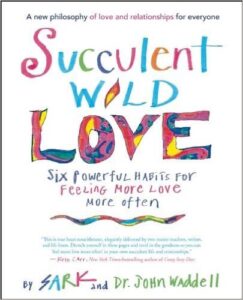
About the book:
A new philosophy of love and relationships for everyone
Relationships do not require compromise or sacrifice
You can create joyful solutions instead
SARK has made a career out of sharing her personal, journal-like writings and art, and inspiring others with her vulnerable and honest journeys toward self-acceptance. She has helped her legions of fans craft lives filled with joy, creativity, and self-love — and she even married herself in a “statement of self-liberation” described in Succulent Wild Woman. And yet SARK had one big secret wish: overcoming her fears to commit to an intimate life partnership. So she embarked on a “Covert Love Operation,” and, after much soul-shaping, it culminated in her meeting psychologist and spiritual teacher Dr. John Waddell — and discovering Succulent Wild Love. They now teach and mentor together using the principles in this book — six powerful habits that can transform any relationship or open you to create the partnership you want.
Over 175 pieces of SARK original art included
About the authors:
SARK (Susan Ariel Rainbow Kennedy) is a bestselling author, artist, and teacher. She comes from a background of creative expression and inspires others through her teachings in her 16 bestselling books, products, and programs to support empowered living. SARK’s purpose is to be an uplifter, a transformer, and a laser beam of love. She does that through her art, words, and spirit.
For over 30 years, Dr. John Waddell’s work has focused on helping individuals and couples lead happier lives. Whether in his clinical psychology practice or in his teaching of metaphysics, his approach has been to provide concrete tools and practices that help people create the lives they want.
 About the book: Everyone thrives on love, comfort, and the safety of family, friends, and community. But if you are denied these basic comforts early in life, whether through a lack of physical affection or emotional bonding, you may develop intense fears of abandonment that can last well into adulthood―fears so powerful that they can actually cause you to push people away. If you suffer from fears of abandonment, you may have underlying feelings of anger, shame, fear, anxiety, depression, and grief. These emotions are intense and painful, and when they surface they can lead to a number of negative behaviors, such as jealousy, clinging, and emotional blackmail. In Love Me, Don’t Leave Me, therapist Michelle Skeen combines acceptance and commitment therapy (ACT), schema therapy, and dialectical behavioral therapy (DBT) to help you identify the root of your fears. In this book you’ll learn how schema coping behaviors―deeply entrenched and automatic behaviors rooted in childhood experiences and fears―can take over and cause you to inadvertently sabotage your relationships. By recognizing these coping behaviors and understanding their cause, you will not only gain powerful insights into your own mind, but also into the minds of those around you. If you are ready to break the self-fulfilling cycle of mistrust, clinginess, and heartbreak and start building lasting, trusting relationships, this book will be your guide.
About the book: Everyone thrives on love, comfort, and the safety of family, friends, and community. But if you are denied these basic comforts early in life, whether through a lack of physical affection or emotional bonding, you may develop intense fears of abandonment that can last well into adulthood―fears so powerful that they can actually cause you to push people away. If you suffer from fears of abandonment, you may have underlying feelings of anger, shame, fear, anxiety, depression, and grief. These emotions are intense and painful, and when they surface they can lead to a number of negative behaviors, such as jealousy, clinging, and emotional blackmail. In Love Me, Don’t Leave Me, therapist Michelle Skeen combines acceptance and commitment therapy (ACT), schema therapy, and dialectical behavioral therapy (DBT) to help you identify the root of your fears. In this book you’ll learn how schema coping behaviors―deeply entrenched and automatic behaviors rooted in childhood experiences and fears―can take over and cause you to inadvertently sabotage your relationships. By recognizing these coping behaviors and understanding their cause, you will not only gain powerful insights into your own mind, but also into the minds of those around you. If you are ready to break the self-fulfilling cycle of mistrust, clinginess, and heartbreak and start building lasting, trusting relationships, this book will be your guide.









